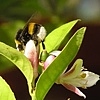 |
Citrus Growers Forum
|
| Poncirus trifoliata "Rubidoux" |
| Author | Message | |||||||||
|---|---|---|---|---|---|---|---|---|---|---|
| Roberto Citruholic  Joined: 02 Jun 2009 Posts: 132 Location: Vienna/Austria |
|
|||||||||
| Millet Citruholic   Joined: 13 Nov 2005 Posts: 6657 Location: Colorado |
|
|||||||||
| Roberto Citruholic  Joined: 02 Jun 2009 Posts: 132 Location: Vienna/Austria |
|
|||||||||
| Las Palmas Norte Citruholic   Joined: 18 Nov 2005 Posts: 199 Location: Lantzville, Vancouver Island |
|
|||||||||
| ivica Moderator   Joined: 08 Jan 2007 Posts: 658 Location: Sisak, Croatia, zone 7b |
|
|||||||||
| bussone Citruholic  Joined: 30 Apr 2013 Posts: 68 Location: Philadelphia, PA, USA |
|
|||||||||
| yuzuquat Citruholic  Joined: 01 Sep 2013 Posts: 114 Location: manchester, england |
|
|||||||||
| Millet Citruholic   Joined: 13 Nov 2005 Posts: 6657 Location: Colorado |
|
|||||||||
| elsedgwick Citruholic  Joined: 26 May 2012 Posts: 137 Location: Thomasville, GA (8b)/Tallahassee, Fl (9a microclimate) |
|
|||||||||
| Informations | |
 |
Our users have posted a total of 66068 messages We have 3235 registered members on this websites |
| Most users ever online was 70 on Tue 30 Oct, 2012 10:12 am | |
|
Powered by phpBB © 2001, 2005 phpBB Group
|
